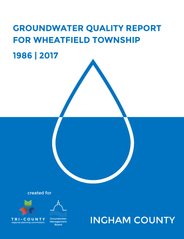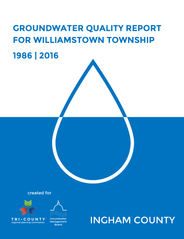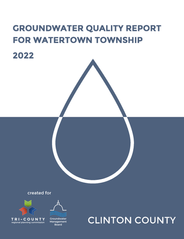HOME > PROJECTS & DOCUMENTS > ENVIRONMENT & NATURAL RESOURCES > GROUNDWATER SURVEY
Groundwater Surveying in Michigan’s Capital Region
The tri-county region relies on groundwater for the vast majority of our drinking water resources, whether it’s delivered to consumers’ homes through public water suppliers or individual private wells. Relying on this underground and out-of-sight resource requires an innovative approach to properly manage its consumption and ensure its safety for all.
To better understand our groundwater system, the Ingham County Health Department participated in the Southwest Michigan Groundwater and Monitoring Program, better known as the Michigan Groundwater Survey (MGS). This was a project started in 1983 by Western Michigan University with financial support from the W. K. Kellogg Foundation. As one of 18 communities in Michigan to participate in MGS, the county sampled over 300 wells and analyzed the groundwater quality of all 16 of its townships. This original survey, published as the "Report on the Aquifer of Ingham County," identified local concerns associated with activities - such as road salting - and levels of arsenic, nitrate, boron, and fluoride above drinking water standards and recommendations. The identification of these issues has been used by Ingham County to initiate programs to help protect our groundwater resources.
At the time the MGS was conducted, the plan was to survey groundwater quality every 10 to 20 years to monitor any general changes; however, the original wells included in the MGS program have not be resampled since the 1983 study was completed in 1987. Recently, there has been interest in resampling these wells to compare current results with past analysis and to monitor overall groundwater quality across the entire tri-county region of Clinton, Eaton, and Ingham counties.
Changes in Groundwater Quality in Tri-county Lansing Area from 1980 to 2023
Ingham County Surveying
In 2015, the Ingham County Groundwater Survey project began as a follow-up to the original 1980s report in partnership with the U.S. Geological Survey. The goal of the survey was to re-sample as many of the same wells as possible to identify any changes in the composition of the county’s groundwater. This also provided an excellent opportunity to educate well owners on well protection, determine future strategies for groundwater protection, and provide a framework to expand the project into Eaton and Clinton counties.
Thanks to countless hours of work from volunteers, support from the Groundwater Management Board and Tri-County Regional Planning Commission, and a wide range of partnerships across the county, the project completed well sampling in all of Ingham County's 16 townships in the summer of 2020. A comprehensive county-wide report was published in 2021 and the results were shared with each corresponding community to help educate public officials on effectively managing our groundwater. The county-wide report and each of the individual township reports may be viewed in the gallery at the bottom of the page.
Clinton County Surveying
In partnership with the Lansing Board of Water & Light, the Groundwater Management Board kicked off a pilot study in DeWitt Charter and Bath Charter townships to create an approach for sampling wells in communities that were not part of the initial MGS program and may not have data available for comparison to the data collected in the 1980s. Well sampling and the individual township reports for this pilot project were completed in 2021.
Discussions regarding increasing efforts to expand analysis of the ratio between chloride and bromide, which can be an indicator of potential impacts from increased road salting or septic system discharge, are ongoing. Expanding the project into Clinton County has continued with the sampling of Watertown Charter Township. The individual township reports may be viewed in the gallery at the bottom of the page.
Eaton County Surveying
During the summer of 2022, the groundwater survey expanded to Eaton County with the sampling of Delta Charter Township. Reports for both Delta and Windsor townships are now available with additional efforts looking into furthering the expansion of this project in the near future.
Partners, including the Michigan Department of Environment, Great Lakes, and Energy and the Michigan Department of Health and Human Services, supported the project by providing public education materials that were shared with homeowners as well sampling was conducted. These packages included information on potential contamination sources of groundwater, proper maintenance of private drinking water wells, and background on groundwater and the Groundwater Management Board.





















